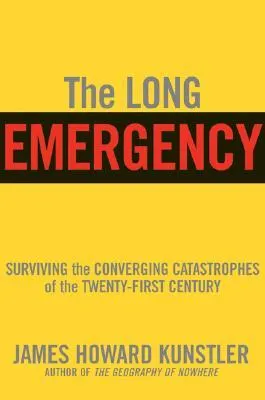The Long Emergency: Surviving the Converging Catastrophes of the Twenty-First Century

Navigating the Turbulent Future: Insights from "The Long Emergency" by James Howard Kunstler
Introduction: Peering into the Abyss of the 21st Century
Embark on a thought-provoking exploration of the challenges that await us in the 21st century with James Howard Kunstler's "The Long Emergency: Surviving the Converging Catastrophes of the Twenty-First Century." This isn't your typical doomsday prophecy; it's a candid and urgent discussion about the converging crises that could reshape our world. As we grapple with the complexities of the future, Kunstler's work serves as both a warning and a guide for navigating the long emergency ahead.
Awakening to the Reality of Change
Reflecting on my own awakening to the reality of global challenges, I remembered a moment of realization triggered by a news article about climate change. "The Long Emergency" promised to deepen my understanding of the interconnected crises we face, prompting me to confront the uncomfortable truths of the future.
The Converging Catastrophes
Kunstler paints a vivid picture of the converging catastrophes that could define our future—climate change, energy depletion, and geopolitical instability. Instead of presenting these issues in isolation, he weaves them into a tapestry that illustrates the potential compounding effects of these crises.
Connecting the Dots of Personal Experiences
Thinking about my own encounters with environmental changes, I realized how interconnected these crises are. Kunstler's approach of connecting the dots between climate, energy, and geopolitics mirrored the way these issues entwined in my own observations of the world.
The Implications of Peak Oil
A central theme of the book is the concept of peak oil—the point at which global oil production reaches its maximum and begins to decline. Kunstler delves into the ramifications of a post-peak oil world, exploring how it could reshape our economies, lifestyles, and geopolitical landscapes.
Peak Oil and Personal Reflection
Contemplating the implications of peak oil, I thought about the dependence of our modern lives on this finite resource. Kunstler's insights served as a catalyst for personal reflection, prompting me to consider the changes that could unfold in my own life as a result of diminishing oil supplies.
The Role of Geopolitics in Shaping the Future
Geopolitics takes center stage in Kunstler's narrative, with an emphasis on how the struggle for resources could lead to conflicts on a global scale. The book explores how geopolitical shifts and power dynamics may intensify as nations contend with the challenges of a changing world.
Geopolitics Hits Home
Recalling discussions about geopolitical tensions, I thought about how distant these issues could seem. Kunstler, however, brought them closer to home, making me realize that the political decisions shaping our world have a direct impact on our daily lives.
Adapting to a Different Future
Rather than succumbing to a bleak outlook, Kunstler encourages readers to consider how communities and individuals can adapt to the changing landscape. He explores the potential for localized solutions, resilient communities, and a shift towards more sustainable practices.
Adaptation and Personal Choices
Considering my own ability to adapt, I thought about small changes I could make in my lifestyle to contribute to a more sustainable future. Kunstler's focus on adaptation resonated with the idea that individual choices, when multiplied, can have a significant impact.
Conclusion: Navigating the Long Emergency
In "The Long Emergency," James Howard Kunstler invites readers to confront the harsh realities of the converging catastrophes shaping our century. It's not just a doomsday scenario; it's a call to action, urging us to be proactive in the face of impending challenges. Kunstler's work is a compass for navigating the long emergency and seeking pathways to a more resilient and sustainable future.